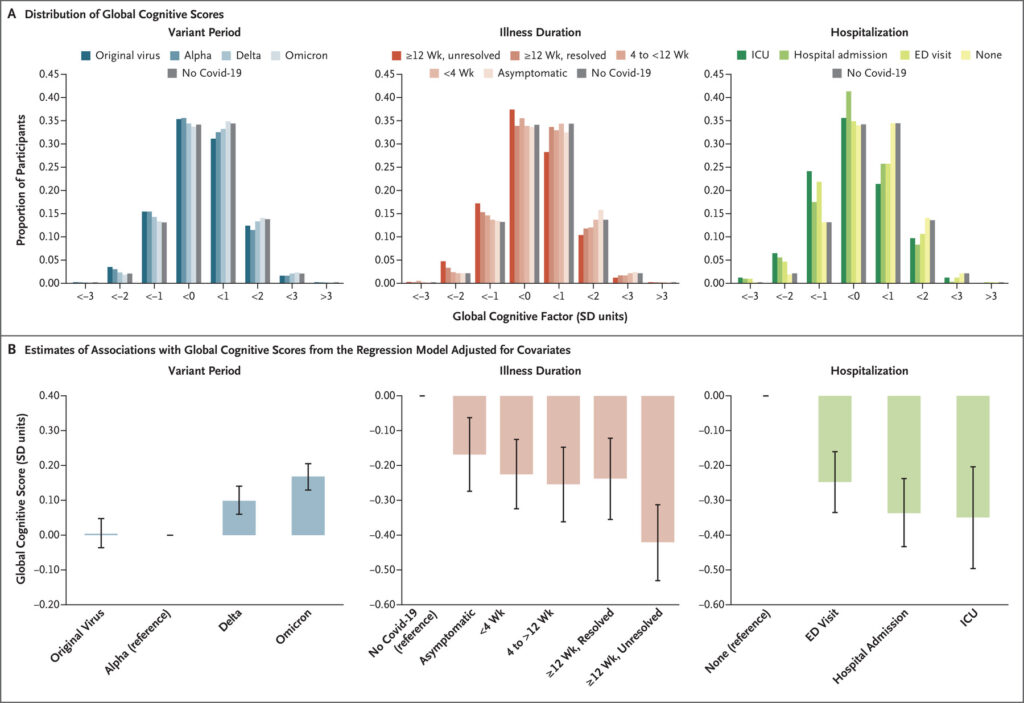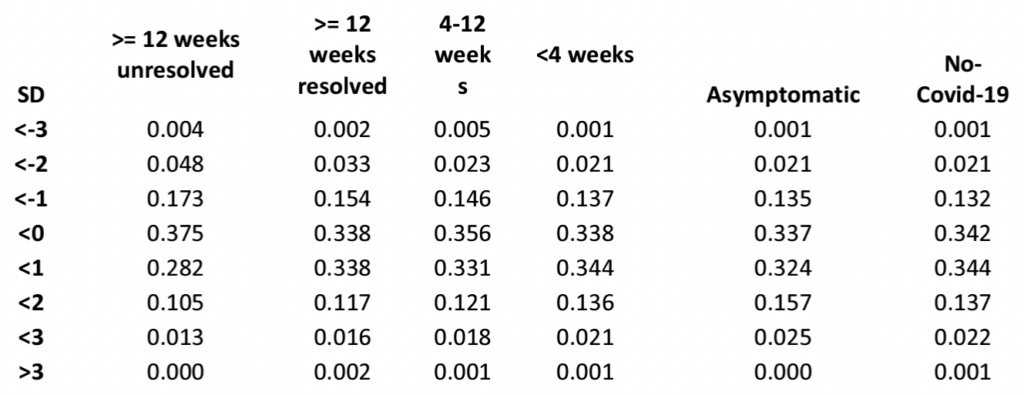Recent headlines would have us believe that catching Covid makes you less intelligent, with even mild infections knocking several points off your IQ. All these headlines refer to a study by Adam Hampshire and colleagues published in the New England Journal of Medicine.
The study was based on the Real-Time Assessment of Community Transmission (REACT) cohort in England – a sample of 2.4 million people who were randomly selected to take a Covid test during the pandemic. Of the original participants, about 110,000 subsequently completed an online questionnaire and cognitive test. And of these, about 10,000 people were excluded because their symptoms began less than 12 weeks before taking the cognitive test.
The authors therefore had data on cognitive ability and Covid infection for about 100,000 people. As for Covid infection, they knew both the date of infection and its severity, measured by the number and duration of various symptoms. They also had data on people’s demographic characteristics and pre-existing health conditions.
Their main findings are shown below. The top three charts plot the distribution of cognitive test scores by variant, illness duration and hospitalisation. All three comparisons are adjusted for demographic characteristics and pre-existing health conditions. The bottom three plot average differences based on a model that estimates the effect of each variable controlling for the other two, along with demographic characteristics and pre-existing health conditions.

The two blue charts on the left show that people who caught the original virus or the Alpha variant scored lower than those who caught the Delta or Omicron variants or who didn’t catch Covid during the study period. The red charts in the centre show that people whose symptoms persisted scored lower than those whose symptoms were short-lived. And the green charts on the right show that people who were hospitalised scored lower than those who weren’t.
The first thing to say is that Hampshire and colleagues didn’t actually look at change in test scores, which means that headlines referring to “drops in IQ” or “falls in IQ” are highly misleading. Rather, they looked at the association between test scores and illness duration/severity across individuals. As the authors clearly state, “we could not assess cognitive change” and “we could not infer causality”.
However, it’s true that one possible explanation for their findings is that Covid infection has a causal effect on cognitive ability – reducing it by 42% of a standard deviation (6 IQ points) among those with symptoms lasting more than 12 weeks. How likely is this? Before getting to an alternative explanation, I will highlight several things in the paper that caught my eye.
First, if you go to Table S6 in the Supplementary Appendix, you find the exact distributions of cognitive scores corresponding to the top three charts in the image above. These confirm that individuals who caught the Omicron variant, individuals who had asymptomatic infections, and individuals who required no medical treatment, had a marginally better (i.e., more right-shifted) distribution of scores than those who did not catch Covid during the study period.

Second, the authors estimated the effects of variant, illness duration and hospitalisation on a cognitive score variable that was standardised after adjustment for demographic characteristics and pre-existing health conditions. Depending on the interrelationships among the variables, this may have resulted in larger effects of variant, illness duration and hospitalisation than would have been observed if standardisation had been done before adjustment.
Third, if you go to Table S7 in the Supplementary Appendix, you find the output from a multivariate model of cognitive test scores that includes a predictor for number of vaccine doses. The output seems to imply that vaccination had a statistically significant negative effect on cognitive ability. This is contrary to a Swedish study which found a strong positive association between vaccination and cognitive ability. I say “seems to imply” because the output is rather unclear. It’s possible that I am misinterpreting how the vaccine doses variable was coded. (The authors did not respond to my request for clarification.)
But let’s take the main findings at face value. Could they be explained by something other than Covid infection having a causal effect on cognitive ability? Yes: self-selection.
We know that people with higher cognitive ability tend to work in professions that had lower risk of exposure to Covid. Hence they may have been less likely to get infected during the early months of the pandemic and more likely to catch the milder Omicron variant. We also know that people with higher cognitive ability tend to be healthier. So they may have been less likely to become seriously ill when they did catch Covid.
In other words, rather than early and more-serious infections causing lower cognitive ability, it may be that higher cognitive ability caused people to get later and less-serious infections. This explanation is consistent with the first of the three observations I made above.
Overall, the Hampshire and colleagues’ findings are interesting and they clearly warrant further scrutiny. But I’m not yet convinced that Covid infection has a large negative impact on cognitive ability. Having said that, I could certainly believe that an infection bad enough to send someone to the ICU might knock a few points off their IQ – at least temporarily.












To join in with the discussion please make a donation to The Daily Sceptic.
Profanity and abuse will be removed and may lead to a permanent ban.
No but the jabs might.
Anyone falling for a
dodgyfake PCR test and then subsequently claiming to be “C1984” positive is definitely exhibiting signs of a lowered IQ.Absolutely. Add in the diapers. Stabs + Diapers + Bulging Eyes + Distancing = <70 IQ. ‘The Science’ likes it that way.
Careful, hux, cause and effect are notoriously difficult to separate. Even the government experts get it wrong sometimes!
Well if “covid” exists I must have had it more than once by now – I’ve had some flu/colds since 2019. I do a job that is mostly “cognitive” and I haven’t noticed a drop in my performance during or since those bouts of illness.
Excellent analysis as usual Noah. At least the researchers were honest in declaring the absence of causation on the test scores , which should actually be referred to in the title upfront. That would stop university PR people and publicity/virtue seeking journal editors from misrepresenting the results for public consumption usually mediated by activist journos.
A local judge, albeit in an obiter dictum, opined that she believed in the concept of Emotional Quotient (EQ) and that this was a quantity that allegedly could either be measured by some sort of parallel test like that for IQ or deduced from the “well-known” formula EQ=200-IQ. The implications of this are that the higher an individual’s IQ, the lower their EQ and vice versa. Enter competing expert witnesses. According to one “expert witness” this relates to the concept of “left/right hemisphere” dominance in the brain. According to an “expert mathematician”, another formulation is EQ=10000/IQ, with a similar result, the differences being discussed in court at great expense to the taxpayer and to the benefit of the pension funds of lawyers, who are more familiar with operating Excel on their fees calculations than with operating the Binomial Theorem on their algebra. Seriously, what is quite alarming is the way that contentious measurements and quasi-scientific models winds up being the foundation of legal judgements, and that judges admit expert witnesses on the basis of whether their evidence will likely support the Official Narrative on EQ/IQ modelling.
This article leads me to advance a new notion: Sceptical Intelligence (SI), which measures how likely an individual is to embrace as reality a notion that runs counter to their current perception of reality but is consistent with the Official Narrative. It may shed light on the problems of cognitive dissonance which academics have to deal with, and the historical examples of mass hysteria (Salem, Broxstowe…). Perhaps some academic could quantify this and see if SI correlates with IQ, and if it increases or decreases after repeated exposure to the Climate Narrative, the Covid Narrative, the Gender Narrative, the Race Narrative, the Slave Narrative and any number of lesser Mencken Hobgoblins. We really need a randomised trial in which individuals are placed in a culture dish containing nutrients drawn from the current media-government-pharma-UN complex.
Typo..I think you meant Convid
All this ‘research’ tells me is that we spend too much money on our universities. This is definitely in ‘impact of global warming on squirrel mating habits’ territory.
Or could it be people with low IQ we’re more likely to get CoVid? Most people ‘had’ CoVid because a non-diagnostic, highly unreliable test told them so – sometimes having to repeat it three or four times before getting the desired diagnosis confirmed.
Low IQs also rushed to get ‘vaccinated’ thus increasing the risk of getting CoVid multiple times.
I thought that studies showed low IQs and PhDs (don’t know fields) were the least likely to have gotten vaccinated. Moderately “educated” people trust(ed) the experts. Lower IQs probably are used to getting screwed over by the system, and much higher and educated IQs probably know the sausage-making that goes into experts’ pronouncements. Then you also get people like my in-laws with very high IQs but less education who, bless their hearts, are impressed by degrees and totally trusted the experts.
https://www.lifesitenews.com/news/pope-francis-denounces-anti-vaxxers-calls-covid-jab-refusal-an-almost-suicidal-act-of-denial/
The satanic ‘Pope’ mouthing off again.
The only man worth listening to in the Catholic Church is Archbishop Vigano.
Here are things that will cause mental atrophy: Social isolation; Using fear to ‘encourage’ mental conformity while stigmatizing free thinking; making people perform humiliating and pointless rituals such as testing, self isolating, social distancing (an oxymoron), and mask wearing.
The mind is a muscle and being able to think freely within society at large is the best exercise there is, and I don’t consider social media the best places for thinking freely, because the key word is ‘think’.
I suspect that if you ran the same study for influenza or infectious mononucleosis you would find the same result.
I was about to post the same comment – no one has ever bothered to do the same for other diseases as far as I’m aware, so we have no meaningful comparison whatsoever. There was recently a study into post viral issues following Covid vs flu, and embarrassingly it seemed to be much more likely after flu!